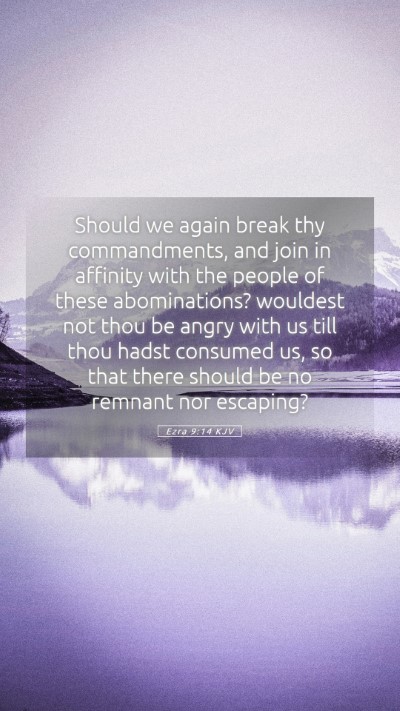Old Testament
Genesis Exodus Leviticus Numbers Deuteronomy Joshua Judges Ruth 1 Samuel 2 Samuel 1 Kings 2 Kings 1 Chronicles 2 Chronicles Ezra Nehemiah Esther Job Psalms Proverbs Ecclesiastes Song of Solomon Isaiah Jeremiah Lamentations Ezekiel Daniel Hosea Joel Amos Obadiah Jonah Micah Nahum Habakkuk Zephaniah Haggai Zechariah MalachiEzra 9:14 Meaning
What is the meaning of Ezra 9:14?
Should we again break thy commandments, and join in affinity with the people of these abominations? wouldest not thou be angry with us till thou hadst consumed us, so that there should be no remnant nor escaping?
Ezra 9:14 Bible Verse Meaning
Bible Verse Meaning of Ezra 9:14
Ezra 9:14 reads, "Should we again break your commandments and join in affinity with the people of these abominations? Would you not be angry with us till you had consumed us, so that there should be no remnant nor survivor?" This verse captures a crucial moment in Ezra's plea for the restoration of Israel after the return from Babylonian exile. The gravity of the situation is emphasized through Ezra's rhetorical questions, underscoring the seriousness of sin and the consequences of disobedience to God's covenant.
Overview of the Context
Ezra, a priest and scribe, leads a group of exiles back to Jerusalem and is deeply concerned about the spiritual state of the returning community. The people had intermarried with surrounding pagan nations, violating God's commands. This led Ezra to lament and seek repentance on behalf of the nation.
Commentary Insights
- Matthew Henry: Henry emphasizes the danger of compromising with surrounding cultures. He argues that these alliances lead to spiritual decay and God's displeasure. This commentary encourages readers to reflect on the importance of maintaining spiritual integrity.
- Albert Barnes: Barnes highlights that Ezra’s question reflects a deep understanding of God’s holiness and justice. His concern reveals a profound sense of the severity of sin and the consequences that arise from breaking covenant with God.
- Adam Clarke: Clarke adds that Ezra identifies the intermingling with other nations as not just a relational issue, but a fundamental breaking of commandment that could result in God’s wrath. Clarke's analysis guides readers to understand the historical context of Israel's purity laws.
Meaning and Application
This passage serves as a powerful reminder of the implications of sin. It challenges believers to consider how modern-day affiliations and friendships may impact their spiritual lives. The verse illustrates the importance of remaining faithful to God’s commandments and recognizing the potential consequences of disobedience.
Spiritual Insights
- Consequences of Sin: The verse implores readers to understand that disobedience can lead to God’s judgment and a forfeiture of His protection.
- Importance of Repentance: Ezra's plea reflects a crucial step toward restoration: acknowledging sin and seeking forgiveness.
- Call to Holiness: The call to not intermarry illustrates a broader biblical theme regarding holiness and separation from worldly influences.
Cross References
- 2 Corinthians 6:14: "Do not be unequally yoked together with unbelievers..." A reminder of the importance of spiritual associations.
- Nehemiah 13:23-27: Nehemiah addresses similar issues concerning intermarriage and upholding God’s laws.
- Deuteronomy 7:3-4: God's command about not intermarrying with pagan nations is reiterated, showing consistency in His directives.
Conclusion
The interpretation of Ezra 9:14 reveals a critical lesson about the impact of sin and the need for faithful adherence to God's instructions. It serves as a sobering reminder that the consequences of turning away from God's commandments are severe and calls for a heartfelt return to His ways. This verse is instrumental for both personal reflection and group discussions, particularly in Bible study groups and online Bible study platforms focused on Bible study lessons and Bible study plans.


